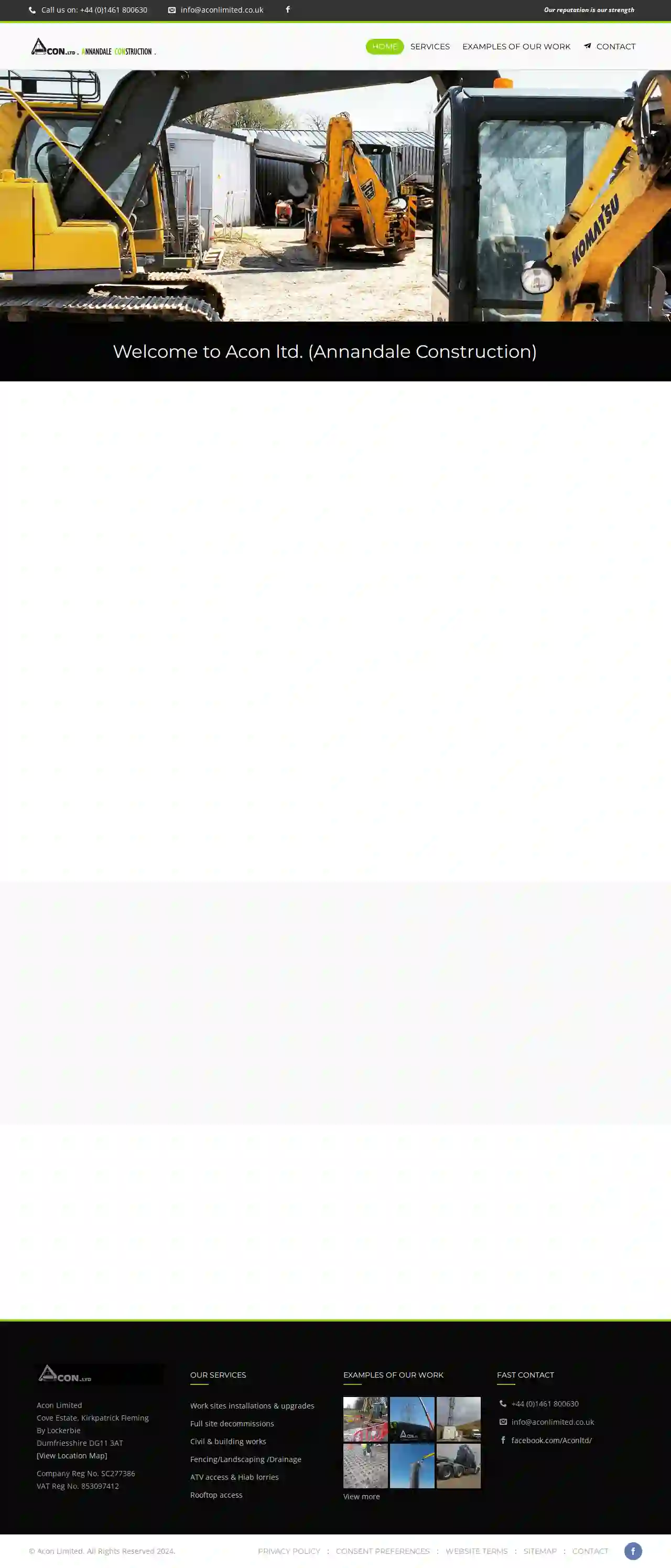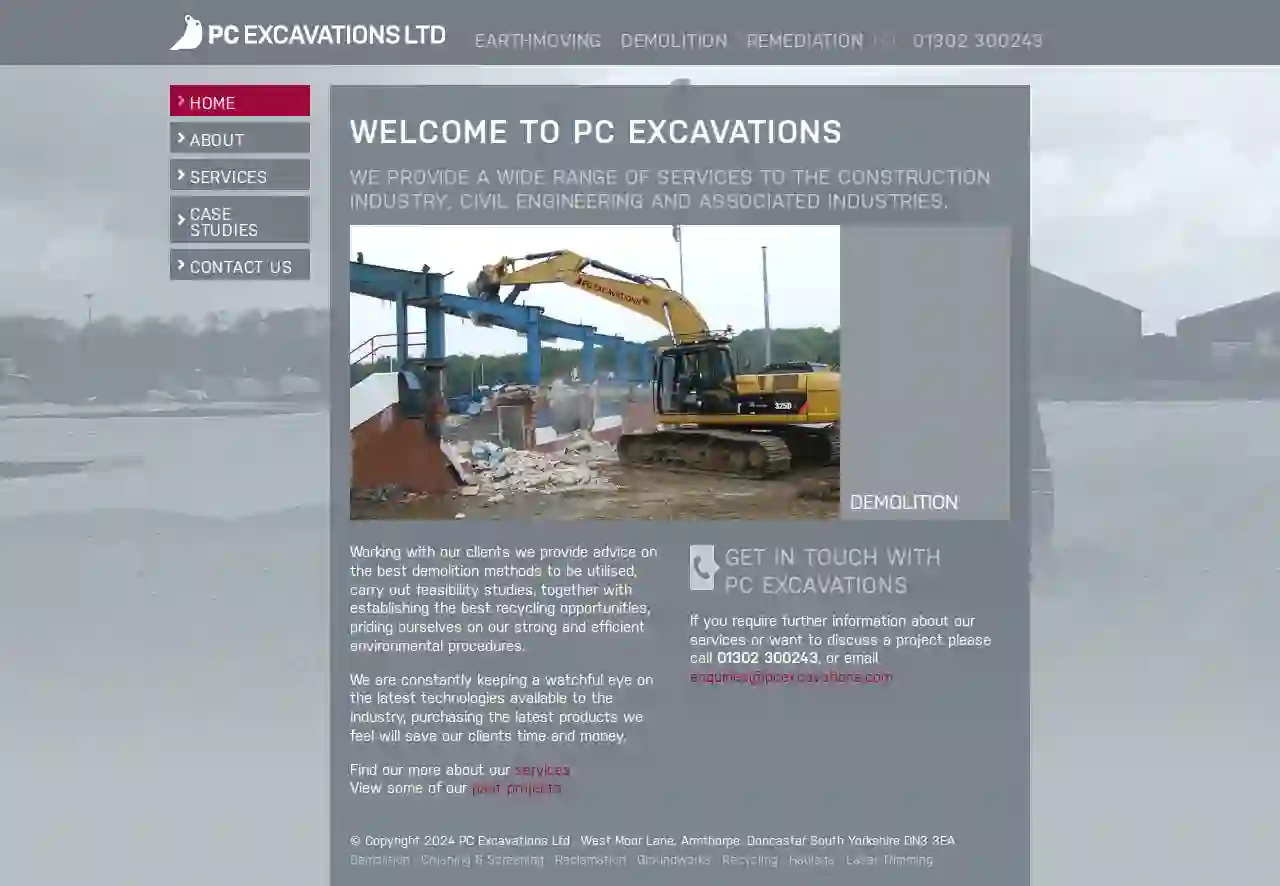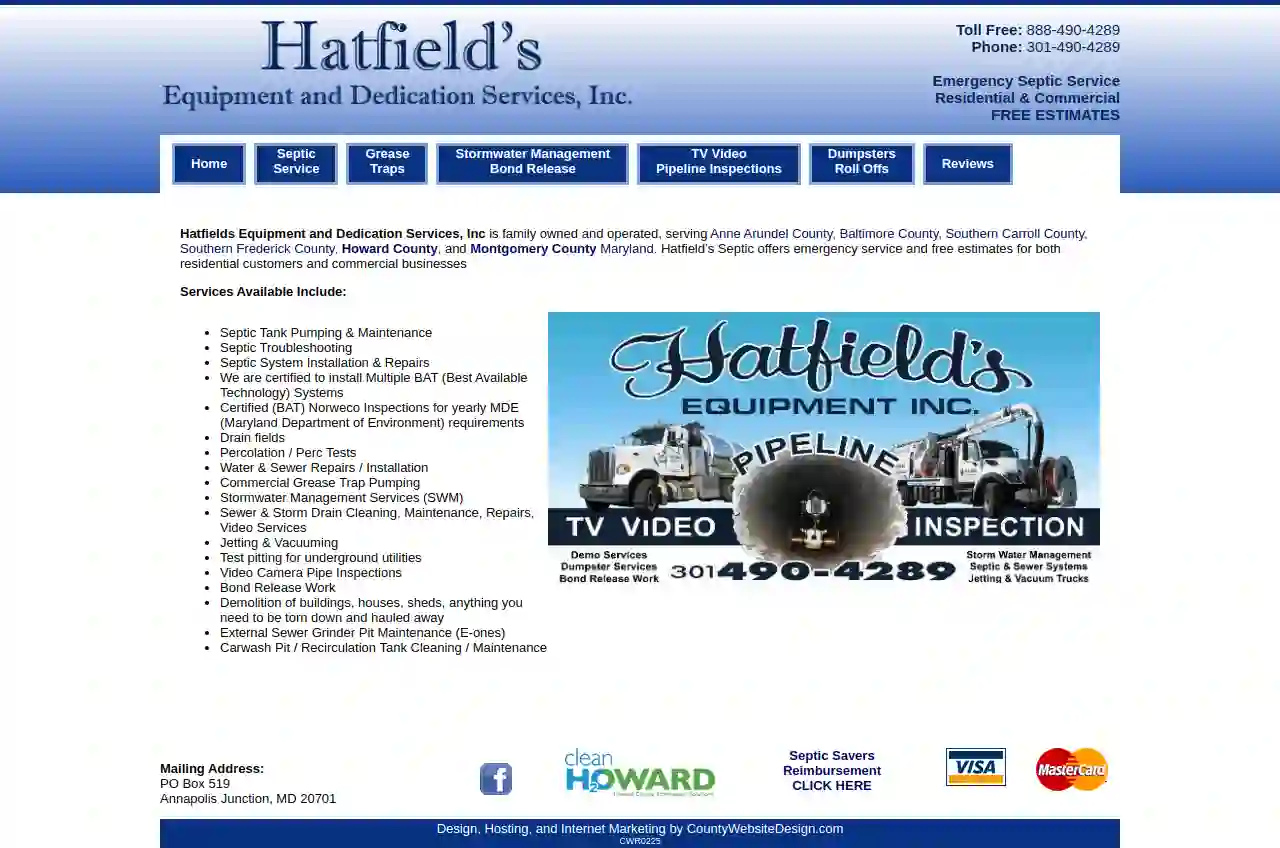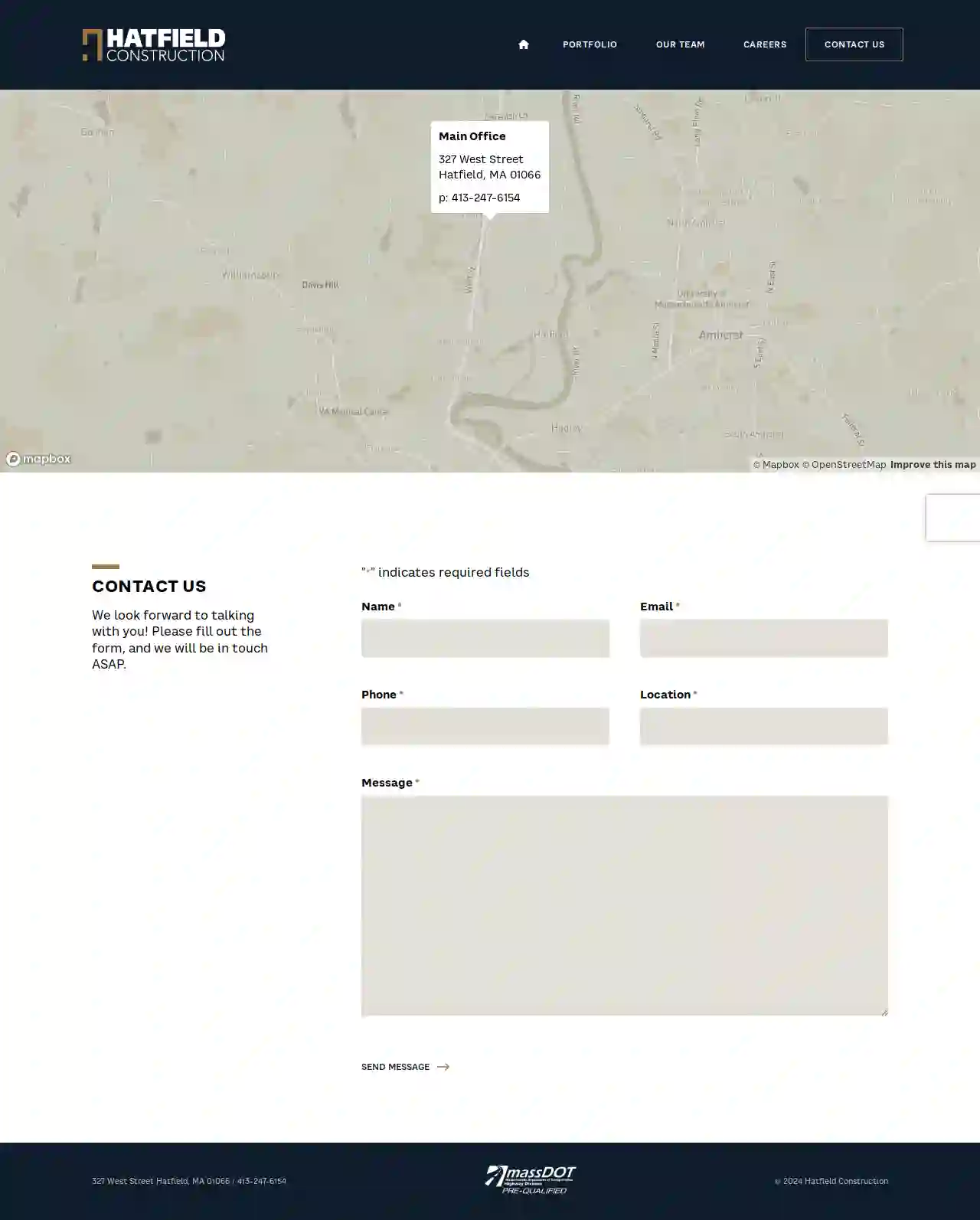Excavation Contractors Conisbrough
Find Excavation Contractor in Conisbrough
Get up to 3 Excavation Services quotes for your project today! Compare profiles, reviews, accreditations, portfolio, etc... and choose the best offer.

Acon limited
52 reviewsCove Estate, Kirkpatrick Fleming, Lockerbie, DG11 3AT, GBACON Ltd UK Based Acon limited operate in the Construction Industry and specialise in the Telecom Sector. The Telecom Sector continues to be at the epicentre for growth and development and here at Acon ltd we have become known and trusted Industry specialists. Acon ltd have become the go to provider for all our client's needs; from rooftop sites, to large scale greenfield sites, to basic street works. We have experience with any and all telecom sites either with new builds or decommissioning and all the steps in between.We have carried out the following services, from the Shetland Islands in the North to Portsmouth in the South: Telecoms industry specialists Excavations Drainage Access roads Steel fixings Concreting High Level Rope Access Rooftop Access ATV Access HGV Hiab plant Lorries- Lift & Shift Lightning Protection Through our sister company LPS (Lightning Protection Services) we can also offer a full range of lightning protection, high level access, rope access, steeplejack and earthing services. Telecom Sector Acon has gained a wealth of experience in the Telecom Sector on sites for all the network providers and continue to meet and exceed the requirements of our clients. Health & Safety All operatives are: CITB registered, trained in rooftop awareness, RF, Cable avoidance, MEWPS, First aid, Banks man slingers, Manual handling, Abrasive wheels ect. and are CSCS registered.
- Services
- Why Us?
- Gallery
Get Quote
PC Excavations Ltd
4.52 reviewsWest Moor Lane, Armthorpe, Doncaster, DN3 3EA, GBAbout PC Excavations With over 40 years of experience, PC Excavations is dedicated to providing high-quality services to all our clients in an efficient and professional manner. We offer a wide range of services to the construction industry, civil engineering, and associated industries. While PC Excavations is a relatively new company, we have a solid financial foundation and excellent relationships with local quarries and tips, backed by substantial credit facilities. Our Commitment We are committed to staying at the forefront of industry advancements, constantly investing in the latest technologies and equipment to ensure our clients benefit from time and cost savings. Our commitment to environmental responsibility is reflected in our strong and efficient environmental procedures, prioritizing recycling opportunities and minimizing waste. Our Clients We are proud to have worked with a diverse range of clients, including: Advanced Diesel Engineering Ltd Aggregates R Us Ltd Andy Collins Aggregates Ltd Askern UK Ltd Atala Forestry Group Ltd Balfour Beatty Cadman Constructions Ltd Carillion Close Building Services Ltd Danum Developments Ltd Doncaster Rugby Club ETL Ltd Hol-Tro Enterprises Ltd JJ Foods Ltd Laing O’Rourke Paragon Quality Foods Ltd Peel Airports Group Phoenix Developments Ltd PS Construction R Baystone & Son Ltd Stainforth Construction Ltd TR Fabrication Ltd Warwick Ward Machinery Ltd Westmoreland Group White Horse Contractors Winvic Construction Ltd Wisconco Ltd Yorkshire Aggregates Yorkshire Horticultural Ltd
- Services
- Why Us?
- Accreditations
- Gallery
Get Quote
Hatfield's Equipment & Dedication Services, Inc.
4.220 reviewsPO Box 519, Annapolis Junction, 20701, GBHatfields Equipment and Dedication Services, Inc Hatfields Equipment and Dedication Services, Inc is a family-owned and operated business serving Anne Arundel County, Baltimore County, Southern Carroll County, Southern Frederick County, Howard County, and Montgomery County Maryland. We offer emergency service and free estimates for both residential customers and commercial businesses. Our Services Hatfields Septic offers a wide range of services to meet your needs, including: Septic Tank Pumping & Maintenance Septic Troubleshooting Septic System Installation & Repairs Certified to install Multiple BAT (Best Available Technology) Systems Certified (BAT) Norweco Inspections for yearly MDE (Maryland Department of Environment) requirements Drain fields Percolation / Perc Tests Water & Sewer Repairs / Installation Commercial Grease Trap Pumping Stormwater Management Services (SWM) Sewer & Storm Drain Cleaning, Maintenance, Repairs, Video Services Jetting & Vacuuming Test pitting for underground utilities Video Camera Pipe Inspections Bond Release Work Demolition of buildings, houses, sheds, anything you need to be torn down and hauled away External Sewer Grinder Pit Maintenance (E-ones) Carwash Pit / Recirculation Tank Cleaning / Maintenance
- Services
- Why Us?
- Gallery
Get Quote
Hatfield Construction
327 West Street, Hatfield, 01066, GBProfessional Site Work Solutions Hatfield Construction is an excavation and earthwork services company that can work as a seamless partner for all of your projects. Our clients count on our commitment to safety, professionalism, and integrity—at every step and from every team member. From day one, we meticulously plan our projects, considering all potential obstacles, to ensure that our deliverables are completed within the specified timeframe and financial constraints. The end product our clients have come to count on is high quality and built to last. Our Values We are a family-run business that has grown and flourished thanks in part to the core values we live by. Trust We act with integrity and do the right thing. Communication We build long-term relationships by maintaining clear and honest communication. Accountability We honor our commitments, expect excellence, and take pride in our work. Respect We embrace diverse perspectives and give everyone the consideration they deserve. Growth We push the boundaries of what’s possible. Our Services At Hatfield Construction, we specialize in complex projects and have access to the administrative and operations support that a larger organization provides. At the end of the day, we simplify your project with our comprehensive list of offerings. Trucking & Hauling Earthwork Excavation & Grading Storm Drainage Trenching Concrete Flatwork Demolition Concrete Cutting & Breaking Utilities Sewer and water Paving Land Clearing Structural Foundations & Slabs Erosion Control Loam & Seed Septic Systems Our Expertise Our priority is to finish projects safely, on time, and on budget. With our exceptional management and professional crews, we’re able to do so without compromising quality. Project Development Emergency Repairs Estimating & Value Engineering Safety Self-Performance Project Management Quality Control Systems Solution-Based Problem-Solving Special Projects Integrated Services Our Team Our team is able to manage and perform complex heavy construction projects safely, efficiently, and with an expert eye for every detail.
- Services
- Why Us?
- Our Team
- Gallery
Get Quote
New Galloway Diggers - Mini Digger Hire, Plant Hire, Excavator & Dumper Hire Dumfries
4.48 reviewsDurnfield, Garner Street Business Centre, Garner Street, Etruria, ST4 7BH, GBGalloway Diggers: Your Reliable Plant Hire Partner in Dumfries and Galloway Galloway Diggers is a trusted plant hire company based in Dumfries, serving the entire Galloway region. We pride ourselves on providing affordable and reliable plant hire services, ensuring your projects run smoothly. Our commitment to quality is reflected in our modern, top-of-the-range machinery, meticulously sanitized before each hire. Whether you need a mini digger, excavator, dumper, or any other equipment, our team is here to support you. We understand the importance of having the right tools for the job, and our diverse range of plant and tool hire options caters to a wide variety of projects. Choose Galloway Diggers for your next project and experience the difference of working with a dedicated and experienced team.
- Services
- Why Us?
- Gallery
Get Quote
SINEVIR CONSTRUCTION LTD
55 reviewsHatfield, GBWe’re the Fastest Unique Crafting Dreams into Reality With over 15 years of expertise, Sinevir Construction transforms visions into tangible structures with precision, quality, and unwavering commitment to customer satisfaction. Expert Craftsmanship Mastery in construction, ensuring precision and quality in every project we undertake, guaranteed. Reliable Service Dependable and professional, our team delivers timely and efficient solutions tailored to your needs. Customer Satisfaction Your vision, our priority. We strive for excellence, exceeding expectations to ensure your complete satisfaction.
- Services
- Why Us?
- Gallery
Get Quote
3b Construction Ltd
54 reviewsCassillis Business Park, Minishant Ayr, Cassillis Business Park Minishant Ayr, Ayr, KA19 8DN, GB3b Construction: Building a Legacy of Excellence For over 15 years, 3b Construction has been a leading force in the construction industry, driven by a commitment to quality, innovation, and customer satisfaction. We've grown from a small, determined team to a thriving company with over 150 dedicated staff working across the UK and Ireland. Our expertise spans a wide range of sectors, including construction, civil engineering, structural steel, plant, and transport. We pride ourselves on our ability to deliver complex projects on time and within budget, while maintaining the highest standards of safety and environmental responsibility. At 3b Construction, we believe in building more than just structures. We build relationships, foster trust, and create lasting value for our clients. Our team of experienced professionals is dedicated to understanding your needs and exceeding your expectations. We're passionate about what we do, and it shows in the quality of our work and the enduring partnerships we forge. Join us on our journey as we continue to shape the future of construction, one project at a time.
- Services
- Why Us?
- Gallery
Get Quote- Hi
Hilltop Surfacing
53 reviewsDoncaster, GBFacebook is a social networking service and website launched in February 2004, owned by Meta Platforms. It is the largest social network in the world, with over 2.91 billion monthly active users as of the first quarter of 2023. Facebook's mission is to give people the power to build community and bring the world closer together. Users can create profiles, add friends and family, share photos and videos, and join groups. Facebook also offers a variety of other features, such as Messenger, Marketplace, and Facebook Watch.
- Services
- Why Us?
- Gallery
Get Quote 
Bast Hatfield Construction, LLC
4.47 reviews1399 Crescent Vischer Ferry Road, Clifton Park, 12065, GBA Leader in the Construction Industry Bast Hatfield Construction is a leader in the construction industry, specializing in commercial and retail facilities throughout the Northeast. We have a dedicated team of over 150 field and administrative professionals who are committed to providing our clients with the highest quality construction services. Why Choose Bast Hatfield? We pride ourselves on customer service and helping our clients achieve their project goals. We have our own workforce and experience to handle all phases of a construction project, from the ground up or that complicated renovation. We are committed to providing our clients with the highest quality construction services at a competitive price. Construction Professionals Our team of construction professionals is dedicated to meeting our clients' needs. We have a proven track record of success in a variety of industries, including retail, commercial, education, healthcare, and hospitality. We are committed to providing our clients with the highest quality construction services at a competitive price.
- Services
- Why Us?
- Gallery
Get Quote
CF Civils & Groundworks Ltd
34 reviewsCompound 15, Carcroft Enterprise Park, Carcroft, Doncaster, DN6 8DD, GBTrusted Groundworks and Civil Engineering Experts CF Civils is a leading groundworks and civil engineering contractor operating across the UK. From minor works to major infrastructure projects, we provide a professional, personal and reliable service. CF Civils and Groundworks are industry leaders with over 30 years experience As a preferred contractor for numerous clients in both the public and private sector, our integrated, in-house teams work with energy and enthusiasm to provide a unique and superior service, adding significant commercial benefits to our clients. Our expertise ensures that every project is executed to the highest standards, with precision and efficiency. Our commitment to reliability extends to the quality of our workmanship and the durability of the solutions we provide. With our comprehensive approach, clients can rely on us as their one-stop solution provider for all their construction needs. Leading the way in groundworks and civil engineering, operating across Yorskhire. CF Civils are leading groundworks and civil engineering contractors located in Yorkshire.
- Services
- Why Us?
- Gallery
Get Quote
Over 13,059+ Excavation Businesses registered
Our excavation contractors operate in Conisbrough and surrounding areas!
ExcavationHQ has curated and vetted the Best Excavation Businesses in Conisbrough. Find a trustworthy business today.
Frequently Asked Questions About Excavation Contractors
- Project Size and Scope: The larger and more complex the excavation, the higher the cost.
- Soil Type: Different soil types require different equipment and techniques, impacting costs. Rocky or clay-rich soil can be more expensive to excavate than loose soil.
- Accessibility: Difficult-to-access sites might require specialized equipment or additional labor, increasing expenses.
- Disposal Costs: Hauling away excavated material (soil, rocks, etc.) to disposal sites incurs additional fees.
- Permits and Inspections: Depending on local regulations, permits and inspections might be required, adding to the overall cost.
- Hauling to Designated Disposal Sites: Transporting excavated material to approved landfills or recycling centers.
- Recycling or Reuse: If suitable, some excavated soil might be recycled for other projects or reused on-site for landscaping or backfilling.
- Complying with Regulations: Adhering to local and environmental regulations for soil disposal to prevent contamination or illegal dumping.
- Planning and Surveying: Defining the excavation area, marking utility lines, and determining the required depth and grade.
- Site Preparation: Clearing vegetation, removing obstacles, and ensuring site accessibility.
- Excavation: Using appropriate equipment (excavators, backhoes, etc.) to remove earth and create the desired excavation.
- Hauling and Disposal: Transporting excavated material to designated disposal sites, complying with environmental regulations.
- Backfilling and Compaction: Refilling the excavation with suitable material and compacting it to achieve the required density and stability.
- Grading and Finishing: Leveling and shaping the surface to the final grade for landscaping or construction.
- Experience: Choose contractors with a proven track record and years of experience in excavation projects similar to yours.
- Licensing and Insurance: Verify that they are properly licensed to operate in your area and carry adequate insurance to protect you from liability in case of accidents or damage.
- Equipment and Resources: Ensure they have the necessary equipment and resources to handle your project efficiently and safely.
- Positive Reviews and References: Check online reviews and testimonials from previous customers. Request references and contact them to inquire about their experience with the contractor.
- Professionalism: Opt for a company that communicates clearly, provides detailed and transparent estimates, and has a responsive and courteous team.
How much does excavation cost?
How do you handle soil disposal after excavation?
What is the excavation process?
How do I find a good excavation contractor?
How much does excavation cost?
- Project Size and Scope: The larger and more complex the excavation, the higher the cost.
- Soil Type: Different soil types require different equipment and techniques, impacting costs. Rocky or clay-rich soil can be more expensive to excavate than loose soil.
- Accessibility: Difficult-to-access sites might require specialized equipment or additional labor, increasing expenses.
- Disposal Costs: Hauling away excavated material (soil, rocks, etc.) to disposal sites incurs additional fees.
- Permits and Inspections: Depending on local regulations, permits and inspections might be required, adding to the overall cost.
How do you handle soil disposal after excavation?
- Hauling to Designated Disposal Sites: Transporting excavated material to approved landfills or recycling centers.
- Recycling or Reuse: If suitable, some excavated soil might be recycled for other projects or reused on-site for landscaping or backfilling.
- Complying with Regulations: Adhering to local and environmental regulations for soil disposal to prevent contamination or illegal dumping.
What is the excavation process?
- Planning and Surveying: Defining the excavation area, marking utility lines, and determining the required depth and grade.
- Site Preparation: Clearing vegetation, removing obstacles, and ensuring site accessibility.
- Excavation: Using appropriate equipment (excavators, backhoes, etc.) to remove earth and create the desired excavation.
- Hauling and Disposal: Transporting excavated material to designated disposal sites, complying with environmental regulations.
- Backfilling and Compaction: Refilling the excavation with suitable material and compacting it to achieve the required density and stability.
- Grading and Finishing: Leveling and shaping the surface to the final grade for landscaping or construction.
How do I find a good excavation contractor?
- Experience: Choose contractors with a proven track record and years of experience in excavation projects similar to yours.
- Licensing and Insurance: Verify that they are properly licensed to operate in your area and carry adequate insurance to protect you from liability in case of accidents or damage.
- Equipment and Resources: Ensure they have the necessary equipment and resources to handle your project efficiently and safely.
- Positive Reviews and References: Check online reviews and testimonials from previous customers. Request references and contact them to inquire about their experience with the contractor.
- Professionalism: Opt for a company that communicates clearly, provides detailed and transparent estimates, and has a responsive and courteous team.